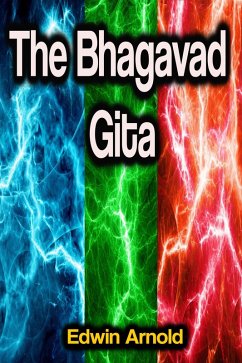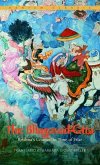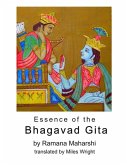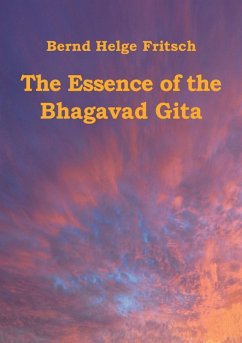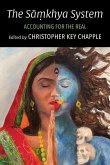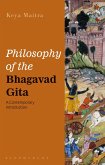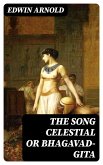The Bhagavad Gita Edwin Arnold - The Bhagavad-Gita is the best known of all the Indian scriptures, and Sir Edwin Arnold's Sanskrit Text to English translation is reliable, readable, and poetic. "The Song Celestial" Sir Edwin produced a well-known poetic rendering of the sacred Hindu scripture Bhagavad-Gita. In his autobiography, Mahatma Gandhi recalled when two theosophist brothers gave him The Song Celestial during his studies in England. This was the first time Gandhi had ever read the Gita, as he had never read it in Sanskrit nor in Gujarati. Gandhi adored this version, stating: "I have read almost all English translations [...] and I regard Sir Edwin Arnold's as the best." Gandhi also invited Edwin Arnold to be the vice-president of the Vegetarian Society in London. This famous and marvellous Sanskrit poem occurs as an episode of the Mahabharata, in the sixth--or "Bhishma"--Parva of the great Hindoo epic. It enjoys immense popularity and authority in India, where it is reckoned as one of the ``Five Jewels,"--pancharatnani--of Devanagiri literature. In plain but noble language it unfolds a philosophical system which remains to this day the prevailing Brahmanic belief, blending as it does the doctrines of Kapila, Patanjali, and the Vedas. So lofty are many of its declarations, so sublime its aspirations, so pure and tender its piety, that Schlegel, after his study of the poem, breaks forth into this outburst of delight and praise towards its unknown author: "Magistrorum reverentia a Brachmanis inter sanctissima pietatis officia refertur. Ergo te primum, Vates sanctissime, Numinisque hypopheta! quisquis tandem inter mortales dictus tu fueris, carminis bujus auctor,, cujus oraculis mens ad excelsa quaeque,quaeque,, aeterna atque divina, cum inenarraoih quddam delectatione rapitur-te primum, inquam, salvere jubeo, et vestigia tua semper adore." Lassen re-echoes this splendid tribute; and indeed, so striking are some of the moralities here inculcated, and so close the parallelism--ofttimes actually verbal-- between its teachings and those of the New Testament, that a controversy has arisen between Pandits and Missionaries on the point whether the author borrowed from Christian sources, or the Evangelists and Apostles from him. This raises the question of its date, which cannot be positively settled. It must have been inlaid into the ancient epic at a period later than that of the original Mahabharata, but Mr Kasinath Telang has offered some fair arguments to prove it anterior to the Christian era. The weight of evidence, however, tends to place its composition at about the third century after Christ; and perhaps there are really echoes in this Brahmanic poem of the lessons of Galilee, and of the Syrian incarnation. Its scene is the level country between the Jumna and the Sarsooti rivers-now Kurnul and Jheend. Its simple plot consists of a dialogue held by Prince Arjuna, the brother of King Yudhisthira, with Krishna, the Supreme Deity, wearing the disguise of a charioteer. A great battle is impending between the armies of the Kauravas and Pandavas, and this conversation is maintained in a war-chariot drawn up between the opposing hosts.
Dieser Download kann aus rechtlichen Gründen nur mit Rechnungsadresse in A, B, BG, CY, CZ, D, DK, EW, E, FIN, F, GR, H, IRL, I, LT, L, LR, M, NL, PL, P, R, S, SLO, SK ausgeliefert werden.

